In 1995, Nelson Mandela lauded a new publication as a ‘timely work deserving our full attention’. And this report, titled ‘Our Global Neighbourhood’, was produced by the Commission on Global Governance.
And though the report did briefly remark as such, it could have made more clear that the overriding objective was Global Governance through principles of a Global Ethic.
People claim this report is ‘conspiratorial’, that it was ‘not taken seriously’ and so forth. Thing is, however, that’s somewhat at odds with reality, as it not only led to a fundamental change in governance within the United Nations, but also caused an absolute explosion in annual NGO registrations with ECOSOC1 - second only to that ‘failed’ event in Copenhagen.
And though ECOSOC 12962 did start this process in 1968, the progressive evolution of global governance was shaped by a series of 12 pivotal reports, ultimately culminating with a model of stakeholder governance which - by and large - has remained unchanged for more than two decades. The governance framework integrates contributions from various sectors, including governments, businesses, civil society, and international organizations, all to - allegedly - address complex global challenges collectively.
Under normal circumstances I’d systemically go through these reports comparing executive summaries, key phrases, and overall messaging. But with 12 reports - yes, 12 - it’d constitute an enormeous amount of work - which no-one would read. Consequently, I will first outline a collective executive summary, detailing how each document contributed towards the final ‘stakeholder approach’ trisectoral governance model - but further detail can be found at the bottom. I planned to use ChatGPT to summarise and compare, but it really does struggle in this regard. Unsure if it genuinely accelerated the process in the end due to its many, many omissions - deliberate or not. Amazing how ‘forgetful’ it can be when discussing certain topics - though in fairness this case is nowhere as exemplary as that provided, in a discussion of ‘democratic legitimacy’ relating to said ‘stakeholder approach’.
-
The Evolution of Global Governance.
Executive Summary.
The concept of structured planning and decision-making in global governance was first introduced in ‘Strategic Management‘ (1984), establishing a foundation for later developments. And though IUCN’s 1980 ‘World Conservation Report’3 officially launched sustainable development, the ‘Brundtland Report‘ (1987) introduced it to the general public; highlighting the need to balance economic growth with environmental protection and social equity (E/S/E). The report further emphasized intergenerational equity, thus setting a moral precedent for future policies.
In 1992, ‘Changing Course‘ and ‘Agenda 21‘ further developed these ideas. The former provided practical strategies for sustainable development - particularly in regards to businesses and governments - thus reinforcing corporate responsibility. The latter - courtesy of Maurice Strong’s Earth Summit - provided a comprehensive action plan, promoting ‘democratic participation and inclusivity’ in decision-making processes. This laid the groundwork for multi-sectoral involvement in global governance.
‘Partnerships for Sustainable Development‘ (1994) highlighted the critical role of the private sector, advocating for collaborative efforts between businesses, governments, and civil society. This report emphasized shared responsibility and ethical corporate conduct, further integrating the private sector into the governance framework. ‘Our Global Neighbourhood‘ (1995) proposed the new governance framework, stressing international cooperation and stronger institutions, promoting global solidarity and shared responsibility.
‘Renewing the United Nations‘ (1997) can be seen as a practical implementation of the ideas and principles outlined in ‘Our Global Neighbourhood‘. The ‘World Commission on Dams‘ (1999) outlined the approach in more detail, but also advocated for the introduction of comprehensive assessments of development projects to balance social, environmental, and economic impacts.
‘Democratic Governance for Human Development‘ (2000) linked democratic governance to human development, calling for the strengthening of democratic institutions, and highlighting the ethical principles of equity and human rights. The ‘UN Global Compact‘ (2000) then reinforced the ethical obligations of businesses in global governance by encouraging businesses to adopt sustainable and socially responsible policies, outlining ten principles that covered human rights, labor, environment, and anti-corruption.
The ‘Millennium Development Goals‘ (2000) provided a comprehensive framework to address global challenges such as education, health, and environmental sustainability. And finally, ‘Critical Choices‘ (2000) explored the potential of public-private partnerships and civil society organisations in addressing global challenges, emphasizing multi-stakeholder engagement.
And building upon the foundation laid by these twelve pivotal reports, advancements since the year 2000 were made, particularly in the fields of enforcement mechanisms and ethical declarations. And while these developments claim to strengthen global governance - ensuring that commitments are not only made but also implemented - in reality these do little but ensure that people (and corporations) tow the line.
-
But wait. There’s more to this story. Because while ‘Our Global Neighbourhood’ stole the limelight - pushing global governance a considerable amount of way in the direction of a global, corporate takeover - another report was similarly released in 1995 which… pushed the initiative in a slightly… different direction. Yes, there’s a 13th report.
And this report - ‘Our creative diversity: report of the World Commission on Culture and Development‘4 - is of contextual importance, because it started the process of redefining the purpose of said global governance.
Which purpose, you might ask. Well, chapter 1 somewhat answers that question. Oh, and with a Jacques Delors5 quote to get us started, too. How quaint.
You see, not only is Jacques Delors a ‘thought leader’ in this regard, but his ‘seminal 1996 report on education, Learning: The Treasure Within, inspires much of today’s work in the global citizenship education field, and emphasizes the importance of lifelong learning.’
And not only is lifelong learning entirely relevant in this context, but he further ’is also a member of the Club of Madrid‘6… yes, the Club of Madrid - and they, too, are of contextual importance (though this will be detailed in a future article).
And no - this most certainly is not ‘missing context’. Here’s the report’s executive summary. Five mentions in that summary alone -
‘Culture’s role is not exhausted as a servant of ends – though in a narrower sense of the concept this is one of its roles - but is the social basis of the ends themselves. Development and the economy are part of a people’s culture‘
Aesopian language (as per usual) - right off the bat. This means that culture also serves as a means. More on that in a minute.
‘Governments cannot determine a people's culture: indeed, they are partly determined by it. But they can influence it for better or worse, and thereby affect the path of development.’
Governments will attempt to influence the culture, and that influence will lead to a changed path of development. So their theory goes, anyway.
’Respect for all cultures whose values are tolerant of others and that subscribe to a global ethics should be the basic principle.‘
Consequently, if you do not subscribe to said ‘Global Ethics’, or your culture’s values are considered ‘intolerant’ - then your culture deserves no respect.
‘Cultural freedom, unlike individual freedom, is a collective freedom. It refers to the right of a group of people to follow a way of life of its choice. Cultural freedom guarantees freedom as a whole.‘
Cultural freedom, in other words, is collectivism, under a veil of ‘cultural freedom’. As expected, the addition of ‘interdependence’ follows 2 pages on.
‘The ultimate aim of development is the universal physical, mental and social well-being of every human being‘
Again, this is about the collective. Not you, ‘indigenous woman’. You’re merely a tool, useful for their purpose.
‘There is an underlying unity in the diversity of cultures, which is defined in a global ethic‘
… funny how all roads lead to exactly that.
‘Democracy can be defined in terms of two institutions - regular and real elections, and a body of real civil rights and liberties. The first institution ensures that governments can be thrown out of office, while the other makes sure that there are some things they must not do even when they hold office.‘
… it’s just breathtaking how manipulative these bastard truly are. Because all of this comes back to the concept of trisectoral governance, call it the ‘stakeholder approach’. I will get back to this - and the concept of ‘culture’ serving as a means - in a minute, but let me finish the executive summary first.
‘The commitment to the peaceful resolution of conflicts and to fair negotiation, and equity both within and between generations, are other important principles of this global ethics. Universalist is the fundamental principle of a global ethics. The ethos of universal human rights proclaims that all human beings are born equal and that they enjoy these rights irrespective of class, gender, race, community or generation. This implies that the basic necessities for a decent life must be the foremost concern of humanity.‘
A call for intergenerational equity - aka ‘the Original Sin’ - calling for your punishment because your grandparents burned their fossil fuel.
‘… and that ethnic identification is a normal and healthy response to the pressures of globalization. Ethnicity acts as a trigger for violent conflict only when it is mobilized and manipulated to do so.‘
This - when weaponised by Marxists - can easily translate into anyone questioning the trillions of ‘refugees’ incessantly pushed upon western nations should be punished for ‘attempting to mobilise’, thus preventing ‘violent conflict’.
Yet, when it’s the other way around, suddenly those ‘human rights’ apply - through their codification into national law through alleged ‘global ethics’. Fancy that.
‘The most durable way to accommodate ethnic diversity is to create a sense of the nation as a civic community, rooted in values that can be shared by all ethnic components of the national society. Such a sense of community is best achieved if the concept of "nation" is freed from any connotations of ethnic exclusivity.‘
And there’s a reason why they simply must eliminate ethnically homogenous nation states - though this strangely appears to be only applied to Western nations.
‘Cultures cannot survive if the environment on which they depend is laid waste or impoverished.‘
Thus, we must trust the quack science on public health and environmentalism - as converted into global ethics, and codified into national law - or those you’ll be accused of killing off marginalised cultures… and probably grannies, too.
‘Cultural policy should be directed at encouraging multi-cultural activities. Diversity can be a source of creativity. Supporting new, emerging, experimental art forms and expressions is not a subsidy to consumption but an investment in human development.‘
And suddenly, destroying your stable, safe, homogenous Western nation is quite simply a must, because it’s an investment in human development and ‘new art forms’. I have truly never read so many Marxist lies in one paragraph before.
‘This Report is an urgent call for the widest possible democratic mobilization… what awaits us is nothing less than a new Renaissance - a new, creative vision of a better world.‘
And I won’t bother with a source in this regard, because if you didn’t already know, then you didn’t pay attention in school - though, that part of history might now be gone from the curriculum, replaced by some complete irrelevance relating to your new ‘multi-cultural society’.
The final part also includes calls for media censorship, though that’s frankly par for the course when you deal with Marxist parasites.
Before we continue with chapter one, let’s just settle two things here. ‘Culture’ - codified in their Aesopian language - means ‘groups’. They couldn’t possibly care less about you as an individual, but they can’t be seen to actively discriminate against ie straight white males, because it would make it too obvious. But if you’re instead considered in the context of your group identity, then suddenly this allows them to actively discriminate against you on grounds of ‘culture’.
And - from above - if your culture is considered ‘intolerant’ (or refuses to accept those arbitrary ‘global ethics’), that leads to the express conditions where they can actively discriminate against your group identity - on grounds of ‘culture’.
Quite frankly, if that doesn’t make you very angry, then you didn’t comprehend. Read again, because this is creating a top-down hierarchy, where they can systemically set up ‘cultures’ versus one another (especially those, suffering from ‘whiteness’), while at the same time call out alleged ‘human rights violations’ should their policy response infuriate locals or even nation states… hey, coincidentally, isn’t that exactly what’s taking place in Ireland at this very minute, given their treasonous politicians, and… er… Mary Robinson installed with the Collegium International7?
The second issue deferred relates to the role of CSOs. The line from above was ‘makes sure that there are some things they must not do even when they hold office‘.
What this, briefly, means is that should your democratic government push through popular policy - though highly inconvenient from the perspective of the United Nations, etc - then foundations will fund rent-a-crowd’s (ie, a Soros-funded outfit, could be Avaaz or Purpose Campaigns) to fabricate some ludicrous claim and pay activists to stir up related trouble, have their fake mainstream media incessantly focus on said fabricated narrative, progressively building up an utterly false MSM talking point - all to get the policy shut down. And should those protestors be arrested, hey, Soros already bought the attourney generals, no?
Now let’s return to the report’s chapter 1 from which we learn -
‘Securing a better future for all may involve sacrifices and will require profound changes in attitudes (including cultural attitudes) and behaviour, not least in people’s social priorities, the educational system, the patterns of consumption, and even the most basic beliefs about how the individual should relate to society and the earth.‘
This isn’t a minor change. This is a major one, which calls for global, systemic changes to education and lifestyle choices.
‘Societies have evolved through the co-operation of peoples with contrasting cultures and it is important to promote cultural conviviality, through new socio-political agreements that should be negotiated in the framework of a global ethics.‘
… and in order to push these through… yes, Global Ethics.
‘In its search for a new ethical orientation, the Commission is not alone but rather resumes various efforts already being undertaken by a number of thinkers and by the recent Commission on Global Governance.‘
The search term ‘Global Ethic’ yields 71 matches in the present document, but only 6 in ‘Our Global Neighbourhood’ (discounting those found in the index). Sure, ‘global civic ethic‘ adds another 8 matches, but even with those counted it’s a one-sided affair.
‘[We] should develop a global ethics that applies equally to all those involved in world affairs. Its efficacy will depend on the ability of people and governments to transcend narrow self-interests and agree that the interests of humanity as a whole will be best served by acceptance of a set of common rights and responsibilities‘
Here we go again with the ‘with rights come responsibilies’ scam.
‘This points to where we must go. The idea is that the values and principles of a global ethics should be the shared points of reference, providing the minimal moral guidance the world must heed in its manifold efforts to tackle the global issues outlined above.‘
… he who controls the fabrication of ‘global ethics’, controls the world.
‘It is not difficult to see that the search for a global ethics involves culture and cultural aspects in numerous ways. To begin with, such an endeavour is itself an emphatically cultural activity, including questions such as Who are we? How do we relate to each other and to humankind as a whole? and What is our purpose?‘
It’s ultimately all about our purpose, but more on that later.
‘There is evolving in our time a global civic culture, a culture which contains further elements to be incorporated in a new global ethics. The idea of human rights, the principle of democratic Legitimacy, public accountability, and the emerging ethos of evidence and proof are the prime candidates for consideration.’
Not only do they seek to dictate global governance through fabricated global ethics, but they also seek to introduce the concept of ‘democratic legitimacy’ (which only their candidates will ever have, strangely), and even introduce an enforcement mechanism down the road through arbitrarily upheld ‘public accountability’8, or ‘prioritising a global governance model ideal’. Oh and hello, Amartya Sen9. Fancy seeing you here.
’The ideals and purposes of the United Nations bodies have acquired a certain ideological legitimacy. Demands for human rights, and the consciousness of a shared earthly ecosystem, which shape expectations throughout the world, are other manifestations of this world culture‘
Try to read that in the voice of Justin Turdeau, who always tells us ‘what Canadians want’ - regardless of how outrageous his lies happen to be.
‘Today, the idea of human rights, though still challenged by recalcitrant governments, is a firmly entrenched standard of political conduct and will have to be a corner-stone of any global ethics‘
And you will only have ‘democratic legitimacy’ if you agree with their ‘global ethics’.
‘The Commission holds that democratic participation is a crucial element of good national governance and that some form of democratic “voice” should also be heard on the international level. Democratic legitimacy will have to be an indispensable principle of a global ethics‘
Disagree, and you will have no ‘legitimacy’, and they will stick the MSM with their incessant lies upon you. Oh yeah, and probably challenge you in courts, eventually10.
‘Science cannot replace politics. Yet political issues often involve empirical questions to be answered on scientific grounds. The efforts that governments and citizens undergo to produce, assess and contest empirical evidence in national and international disputes indicate that science and the scientific ethos are increasingly gaining significance and credibility‘
Now, if only we had an organisation translating science into politics in the context of ‘global ethics’11…
‘But in the second half of this century a radical change of perspective is taking place which may bring science and cultural traditions closer together as well as close the breach between the cultures - to use C.P. Snow's term - that has emerged in the Western world.‘
‘Yet a global ethics must draw on further considerations. It will have to rely on certain universal principles, even if some particular culture may oppose them. This means that the justification of ethical principles is not dogmatic and derivative in character but is a matter of adducing and balancing numerous considerations of different kinds, origins and levels of generality‘
… which creates yet more calls for some raging Marxist to judge said ‘balancing’.
‘It is the Commission’s view that these principles are well-grounded in various fundamental ideas which either carry great moral weight themselves or for which good reasons can be marshaled. Also, the Commission has carefully and self-critically sought to avoid any political partiality in its work. It has listened carefully to scholars, statesmen, artists and others from all parts of the world‘
Golly!12
‘The Commission suggests that the form the core of a new global ethics: Human rights and responsibilities… it should be recognized that rights have to be combined with duties… these rights may better be seen as general principles denoting the fundamental moral concern that in a social and political community ought to find adequate reflection. How exactly these principles should be implemented and what type of institutional arrangements they enjoin is a matter of political imagination and requires taking into account already existing traditions and institutions‘
I can - and will - tell you how this pipeline works in a future article.
‘Freedom of expression is…. without any state-imposed restrictions except to protect national security, public order and public health or to ensure respect for the rights or reputation of others‘
Yes, yes, free speech is a ‘danger to our democracy’, right?
‘Universalist is the fundamental principle of a global ethics... basic principle of intergenerational equity says that present generations must take care of and use the environment and cultural and natural resources for the benefit of all members of present and future generations…‘
Buzzword galore. Universalism. Monistic unified principles. Marx-Carus-Bogdanov-Vernadsky.
‘How the principle of intergenerational equity should be understood cannot be answered without at the same time developing ideas about how to give it institutional form. One of the most interesting recent ideas is the proposal that the best way to protect the interests of future generations might be to provide for a representative in the form of a Guardian and a Guardian office to be set up within the framework of the United Nations and international law‘
… the United Nations should also rule on matters of intergenerational equity? What could possibly go wrong?
‘Many elements of a global ethics are now absent from global governance. Several important institutions of global governance - particularly the Bretton Woods institutions - cannot claim full democratic legitimacy because they are based on the formula “one dollar, one vote”, rather than on the consensus of the people… Market principles are advocated in all fields except in the use of the global commons, such as the global environment, where the rich nations use up over 80 per cent of the environmental resources without paying for them. Concrete suggestions for remedying this situation are made in the International Agenda‘
… fusing ‘global commons’ into ‘global ethics’. Next stop should be bloody obvious to anyone who’s paid attention13.
As for ‘market principles’ - well, ‘carbon emission trading’ is a thing, no?
‘… it is the states that define and maintain the legal and political framework within which they and everybody else moves… it is, nevertheless, first of all for governments and their respective leaders to implement the principles and precepts of a global ethics… It must be the states that are the chief architects seeking to erect and maintain a global constitutional order that is built on moral principles other than power politics‘
Ensuring that the political leaders… sorry, ‘democratically legitimate’ political leaders are reminded of their ‘rights and duties’. Especially the latter part.
‘Last but not least there is the global civil society. The bonds of global non-governmental organizations, voluntary societies, grassroots organizations, churches and other religious associations, action groups, professional societies, interest groups and similar institutions stretch across national frontiers and forge links that bypass national frontiers and loyalties. They constitute the core of any future world citizenship, even though their loyalties may be confined to quite narrow issues or specialized interests. They can mobilize world opinion in order to draw attention to global problems, …‘
And mobilise it… well, the foundations will hire the rent-a-crowd’s. Count on it.
Finally, we have their recommendations -
‘Media rights and self-regulation. Standards of decency, respect for others and self-restraint vary from country to country, and from one period to another. While all forms of censorship must be avoided, nowhere is freedom unqualified or allowed to operate regardless of consequences.‘
‘Protection of cultural rights as human rights,‘
Ie, ‘group rights’ should also be considered ‘human rights’, because otherwise, it’d be more difficult to excuse the active discrimination. Of course, the actual implementation and enforcement will fall upon national governments, ensuring that the United Nations itself keep their hands clean, free to criticise nations states for carrying out their orders in the most grotesque way.
‘The implementation of global ethics in global governance. The Commission believes that the real basis of a global ethics is a common morality‘
And with this implemented, they will finally have displaced religion - an initiative which started with Paul Carus and the 1893 Parliament on World’s Religions. More on that in future article.
‘A people-centered United Nations. Fifty years ago, the United Nations was created in the name of “We, the People”. Today, however, it is primarily the Member States’ governments that run the world body. The Commission feels that the time has come for representatives of the civil society -NGOs, private foundations, indigenous peoples and cultural minorities - to name a few - to have a stronger voice in the United Nations‘
Trisectoral governance. Stakeholder Approach. Global Public Policy Networks. In this context, these all describe the same thing.
‘That is why the Commission recommends that: — the criteria for NGOs accreditation to the United Nations be reviewed as to ensure the widest possible participation of civil society or organization‘
And with the release of this 1995 report - and ‘Our Global Neighbourhood’ - annual ECOSOC NGO registrations absolutely exploded (as shown at the very beginning).
-
‘Our Global Neighbourhood’ was the key document in a sequence of developments, which not only sought to reform global governance in favour of a trisectoral networking model - including participation from the public and private sectors, but also civil society of which a key component are non-government organisations - and these, incidentally, are common recipients of foundation funding… though I’m sure that’s yet another extraordinary coincidence.
But that report also issued a faint call for a ‘global civic ethic’; a call which ‘Our Creative Diversity’ considerably amplified, outlining a detailed range of ideas and suggestions in terms of implementation…
Global Governance through principles of A Global Ethic.
A Global Ethic
We face an increasing amount of calls for ‘Global Citizenship’. Of course, said can’t exist without some level of framework, and though the United Nations at present - utilising complicit national parliamentarians - does everything it can to undermine sovereignty
And as for that initiative - global ethics - the contemporary drive has its origin in France, and further drags in Michel Rocard - co-founder of the Collegium International - and Guy Breibant, a legit communist, who was very influential wrt the International Institute of Administrative Sciences a few decades back.
And this is a good time to call it a day. The big question which remains unanswered is - whose ethics. And though that question was partially answered my substack article on the UDHR, it’s time to detail how the full pipeline works, and the purpose of it all.
And below you can find the more detailed succession of reports, which progressively led to the contemporary global governance ‘stakeholder approach’.
-
1. Strategic Management (1984)
Author: R. Edward Freeman
Conceptual Inputs: Case studies, strategic planning methodologies.
Contributions: Introduced strategic planning in global governance. No direct prior conceptual input but laid groundwork for structured approaches.
Pioneered the integration of strategic management concepts into global governance, emphasizing long-term planning and structured decision-making to tackle global challenges. It laid the groundwork for future reports by advocating for systematic approaches to problem-solving and resource allocation. Ethically, it underscored the need for responsible and forward-thinking management practices, setting a precedent for sustainability and accountability in governance.
-
2. Brundtland Report/Our Common Future (1987)
Author: World Commission on Environment and Development (WCED)
Conceptual Inputs: Global expert contributions, research on sustainable development.
Contributions: Defined sustainable development, built on the idea of strategic management by incorporating long-term environmental considerations.
Link: Our Common Future15
This seminal report introduced the concept of sustainable development, defining it as development that meets present needs without compromising future generations. It highlighted intergenerational equity, environmental stewardship, and social responsibility, thus embedding ethical considerations into global policy discourse. It built on strategic management principles by advocating for holistic and integrated approaches to development, influencing subsequent global sustainability frameworks
-
3. Changing Course (1992)
Author: Business Council for Sustainable Development
Conceptual Inputs: Business perspectives on sustainability, corporate leader contributions.
Contributions: Detailed implementation strategies for sustainability from the Brundtland Report, focusing on business and government roles.
Link: Changing Course16
Building on the Brundtland Report, this report offered practical strategies for implementing sustainable development. It emphasized the role of businesses and governments in aligning their policies with sustainability goals. Ethically, it reinforced corporate responsibility and environmental ethics, stressing the necessity of transitioning to sustainable practices. It expanded on the Brundtland Report's principles, providing actionable recommendations for various sectors.
The report, further, also includes calls for shifting ‘policy mix toward more economic instruments, to reduce carbon dioxide (CO,) and other emissions in the most effective manner, by - tradable permits and incentives/disincentives to correct market signals‘, and evaluation of ‘the introduction of an "insurance premium" on the emissions of pollution even when we do not know the full environmental cost,‘
-
4. Agenda 21 (1992)
Author: United Nations Conference on Environment and Development (UNCED)
Conceptual Inputs: Earth Summit outcomes, multi-stakeholder consultations.
Contributions: Expanded on the Brundtland Report and Changing Course by providing a comprehensive action plan for sustainable development at all governance levels.
This comprehensive action plan from the Earth Summit outlined specific steps for sustainable development at all governance levels. It promoted participatory decision-making and inclusivity, emphasizing democratic participation in global governance. It built on the Brundtland Report and Changing Course by providing a detailed roadmap for implementing sustainable development across diverse sectors and communities.
And worthy of note - a rarely discussed input document (apart from the above) is ‘ASCEND 21’, the output of a conference, arranged by the ICSU (ISC), with participation of the IIASA. And this document not only very heavily influenced the final Agenda 21 output, but was furthermore explicit requested by -
‘This experience, combined with ICSU's long-standing status as a non-governmental, non-political organization, stood it in good stead when Maurice Strong, Secretary General of the United Nations Conference on Environment and Development (UNCED), speaking at ICSU's Global Change Forum in Paris in September 1990, asked ICSU to act as principal scientific adviser in the preparation of the Rio UNCED, or "Earth Summit" (June 1992).‘
-
5. Partnerships for Sustainable Development - The Role of Business and Industry (1994)
Author: Various industry leaders and environmental experts.
Conceptual Inputs: Contributions from industry and environmental experts.
Contributions: Emphasized the role of the private sector, building on Agenda 21’s call for multi-sectoral involvement.
Highlighting the critical role of the private sector, this report called for partnerships between businesses, governments, and civil society to achieve sustainable development. It stressed collaboration and shared responsibility, building on Agenda 21’s multi-sectoral involvement. Ethically, it emphasized the importance of corporate social responsibility and the need for businesses to contribute positively to sustainable development goals.
The report further drags in CERES (1989) and the Forest Stewartship Council (1993) - both of which were identified as successors to the World Commission on Dams, which ‘perfected’ the public-private-CSO-partnership ‘stakeholder’ model, which serves as template for future initiatives.
Finally - make note of two things -
There are no overlapping organisations in the space between the NGOs and the business sectors in the Venn diagram. Is that perhaps because those NGOs are funded by business and their ‘philanthropic’ funders - ie through foundations?
This document is the output of the UNEP, Tufts University, and the Prince of Wales Business Leaders Forum.
-
6. Our Global Neighbourhood (1995)
Author: Commission on Global Governance
Conceptual Inputs: Research on global governance, contributions from international experts.
Contributions: Proposed a new framework for global governance, integrating ideas from the Brundtland Report and Agenda 21 on sustainable and cooperative governance.
This report proposed a new framework for global governance, emphasizing greater international cooperation and stronger institutions. It promoted global solidarity and shared responsibility for addressing global challenges. Building on the Brundtland Report and Agenda 21, it called for comprehensive reforms to enhance the effectiveness and inclusivity of global governance structures, highlighting ethical principles of equity and justice.
And it finally also called for the elimination of the security council veto.
-
7. Renewing the United Nations (1997)
Author: United Nations
Conceptual Inputs: Reviews of UN operations, member state consultations.
Contributions: Focused on UN reform for effectiveness and accountability, building on the need for stronger institutions as highlighted in ‘Our Global Neighbourhood’.
Focusing on UN reform, this report aimed to make the organization more effective, transparent, and accountable. It built on the need for stronger global institutions highlighted in ‘Our Global Neighbourhood’. Ethically, it promoted good governance principles such as accountability, transparency, and inclusiveness, advocating for a more responsive and effective UN system.
And Kofi Annan’s appointment also matters a great deal in this regard.
-
8. World Commission on Dams (1999)
Author: World Commission on Dams
Conceptual Inputs: Case studies of dam projects, stakeholder consultations.
Contributions: Addressed specific sectoral impacts, drawing on the ethical principles of environmental justice from the Brundtland Report and Agenda 21.
This report examined the social, environmental, and economic impacts of large dams, recommending comprehensive assessments and participatory decision-making. It emphasized environmental justice and respect for affected communities, drawing on the ethical principles from the Brundtland Report and Agenda 21. It stressed the importance of balancing development needs with environmental and social considerations.
The WCoD in fact is that important a milestone in the context of trisectoral governance networks, that I covered it in a separate article.
-
9. Democratic Governance for Human Development (2000)
Author: United Nations Development Programme (UNDP)
Conceptual Inputs: Research on governance practices, human development data.
Contributions: Linked governance to human development, building on the democratic participation principles from Agenda 21 and Our Global Neighbourhood.
This UNDP report linked democratic governance to human development, emphasizing the strengthening of democratic institutions and processes. It built on the principles of democratic participation from Agenda 21 and Our Global Neighbourhood. Ethically, it underscored human rights, equity, and empowerment, advocating for governance systems that support human development and social justice.
-
10. UN Global Compact (2000)
Author: United Nations
Conceptual Inputs: Corporate responsibility principles, business leader and NGO contributions.
Contributions: Encouraged corporate responsibility, integrating principles from ‘Partnerships for Sustainable Development’ and the ethical dimensions from the Brundtland Report.
Link: UN Global Compact23
Launched by the United Nations, the Global Compact encouraged businesses to adopt sustainable and socially responsible policies. It outlined ten principles covering human rights, labor, the environment, and anti-corruption, stressing businesses' ethical obligations in global governance. It integrated concepts from ‘Partnerships for Sustainable Development’ and emphasized the ethical dimensions introduced in the Brundtland Report.
-
11. Millennium Development Goals (2000)
Author: United Nations
Conceptual Inputs: International development data, global stakeholder consultations.
Contributions: Comprehensive set of goals building on sustainable development principles from the Brundtland Report, Agenda 21, and the ethical focus on equity and justice from previous reports.
These goals aimed to address global challenges like poverty, education, health, and environmental sustainability. They embodied ethical principles of equity, social justice, and global solidarity. Building on sustainable development principles from the Brundtland Report, Agenda 21, and subsequent reports, the MDGs provided a comprehensive framework for global action and cooperation to improve human well-being.
-
12. Critical Choices (2000)
Author: UN Vision Project on Global Public Policy Networks
Conceptual Inputs: Research on global governance networks, stakeholder consultations.
Contributions: Explored multi-stakeholder networks, building on the partnership concepts from ‘Partnerships for Sustainable Development’ and the inclusive governance principles from ‘Our Global Neighbourhood’.
Link: Critical Choices25
This report explored the potential of public-private partnerships and networks in addressing global challenges. It highlighted multi-stakeholder engagement and collaboration, emphasizing inclusive governance. Building on the partnership concepts from ‘Partnerships for Sustainable Development’ and the inclusive principles from ‘Our Global Neighbourhood’, it promoted innovative approaches to global governance through collaborative networks.






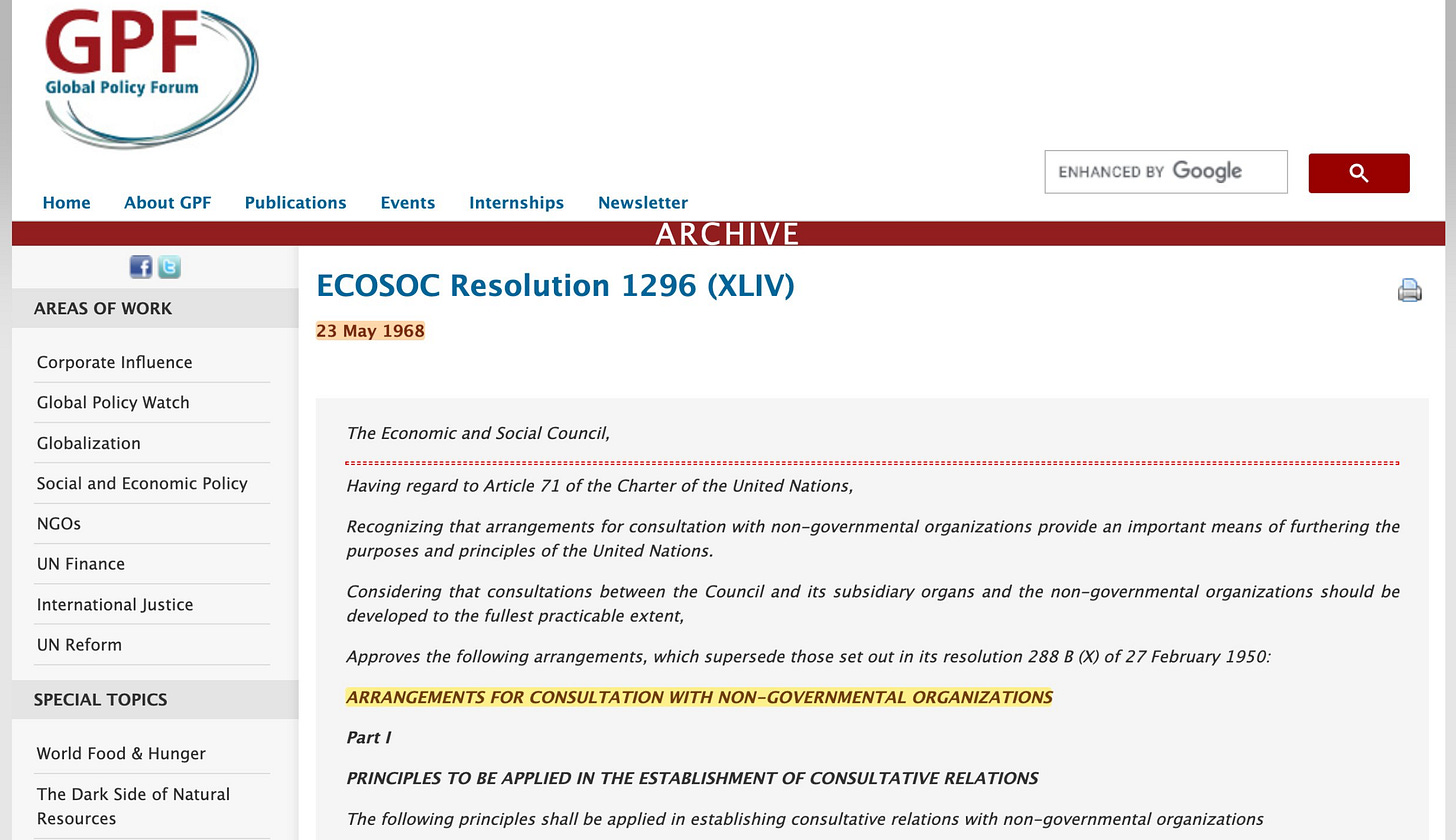



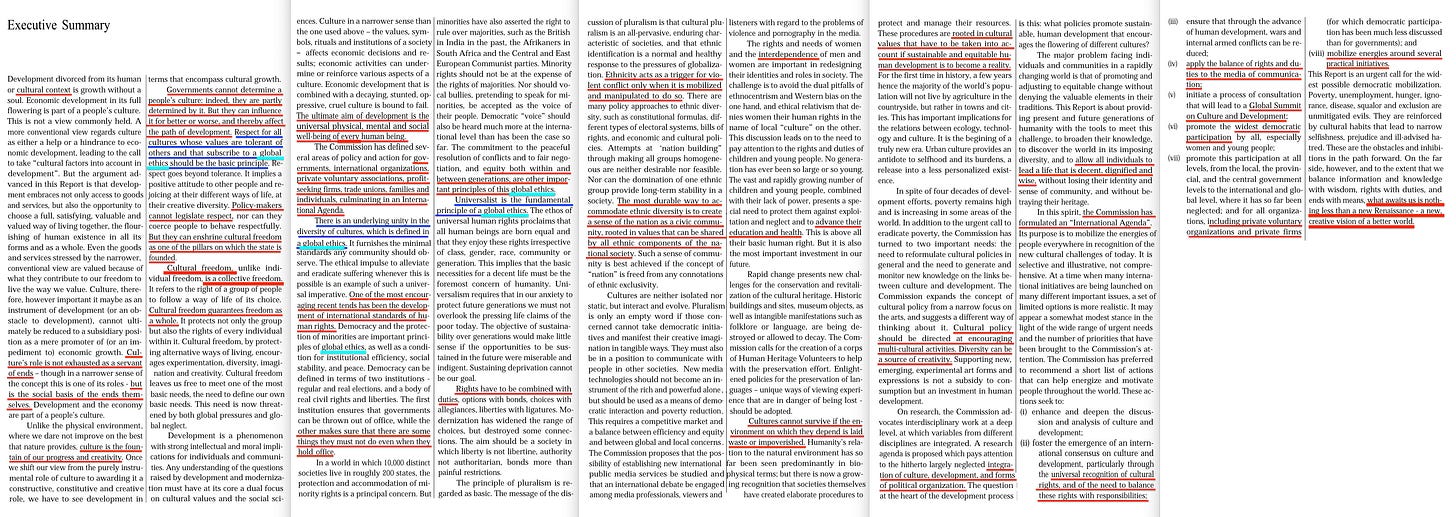









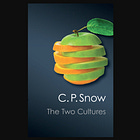
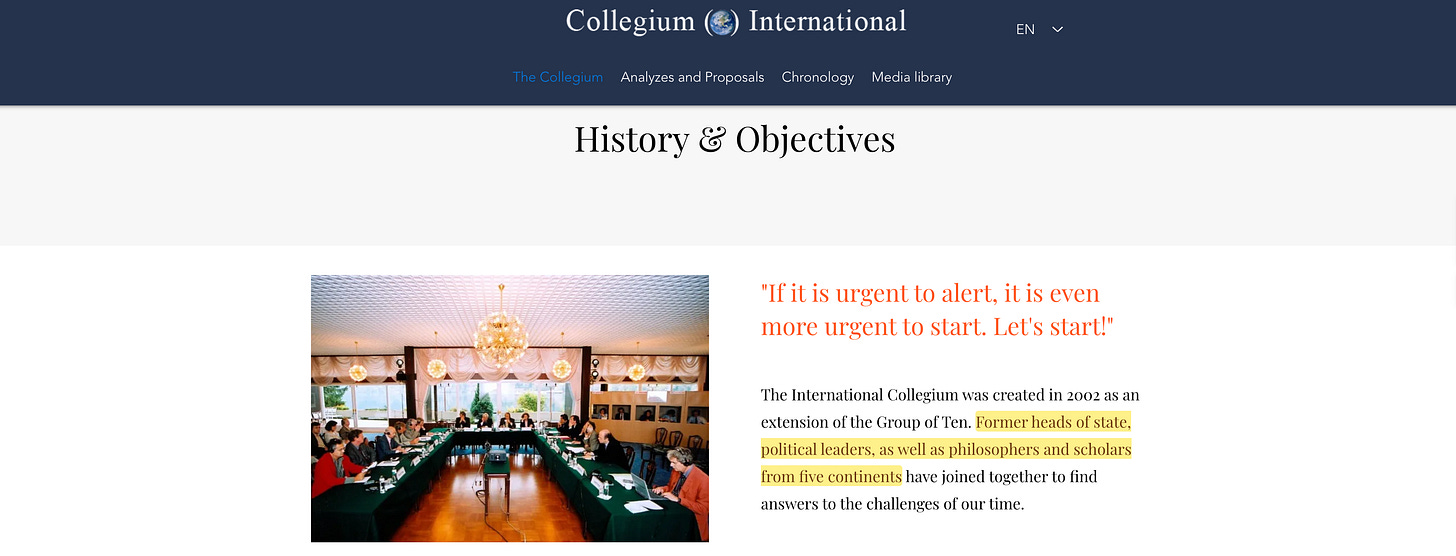
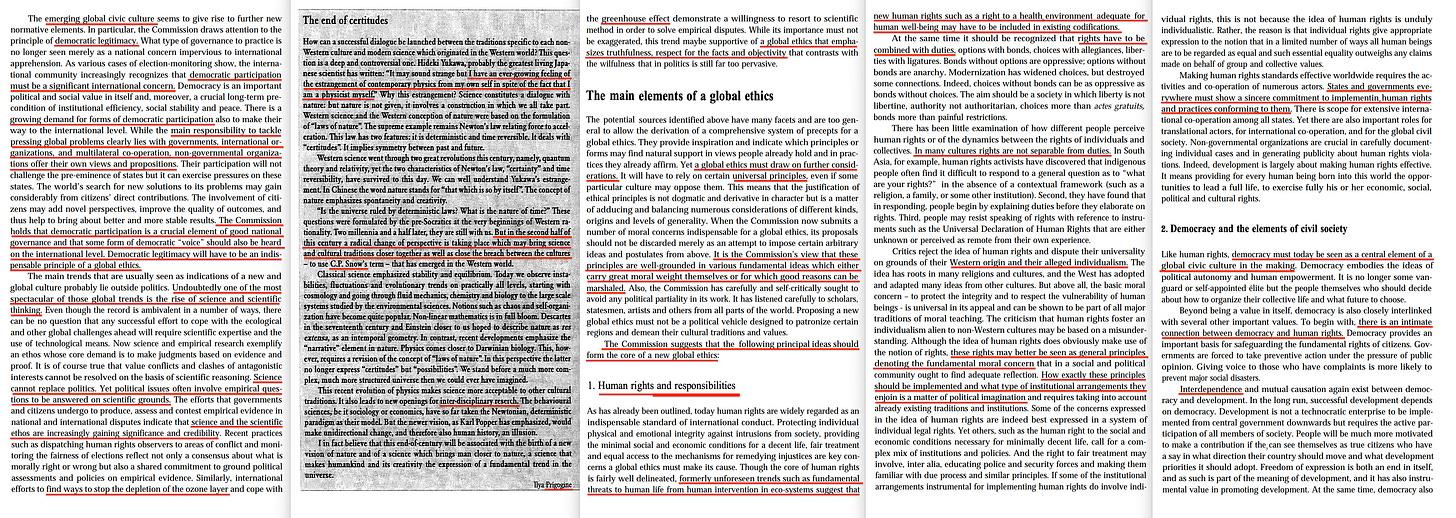





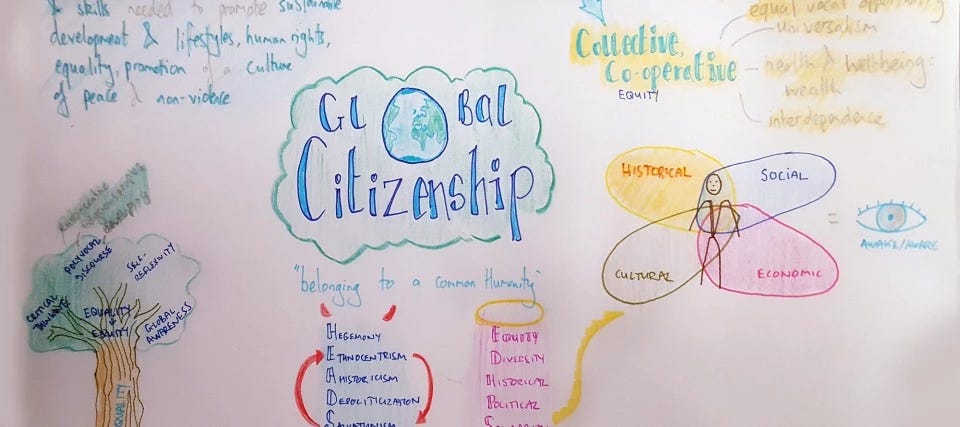
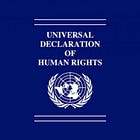




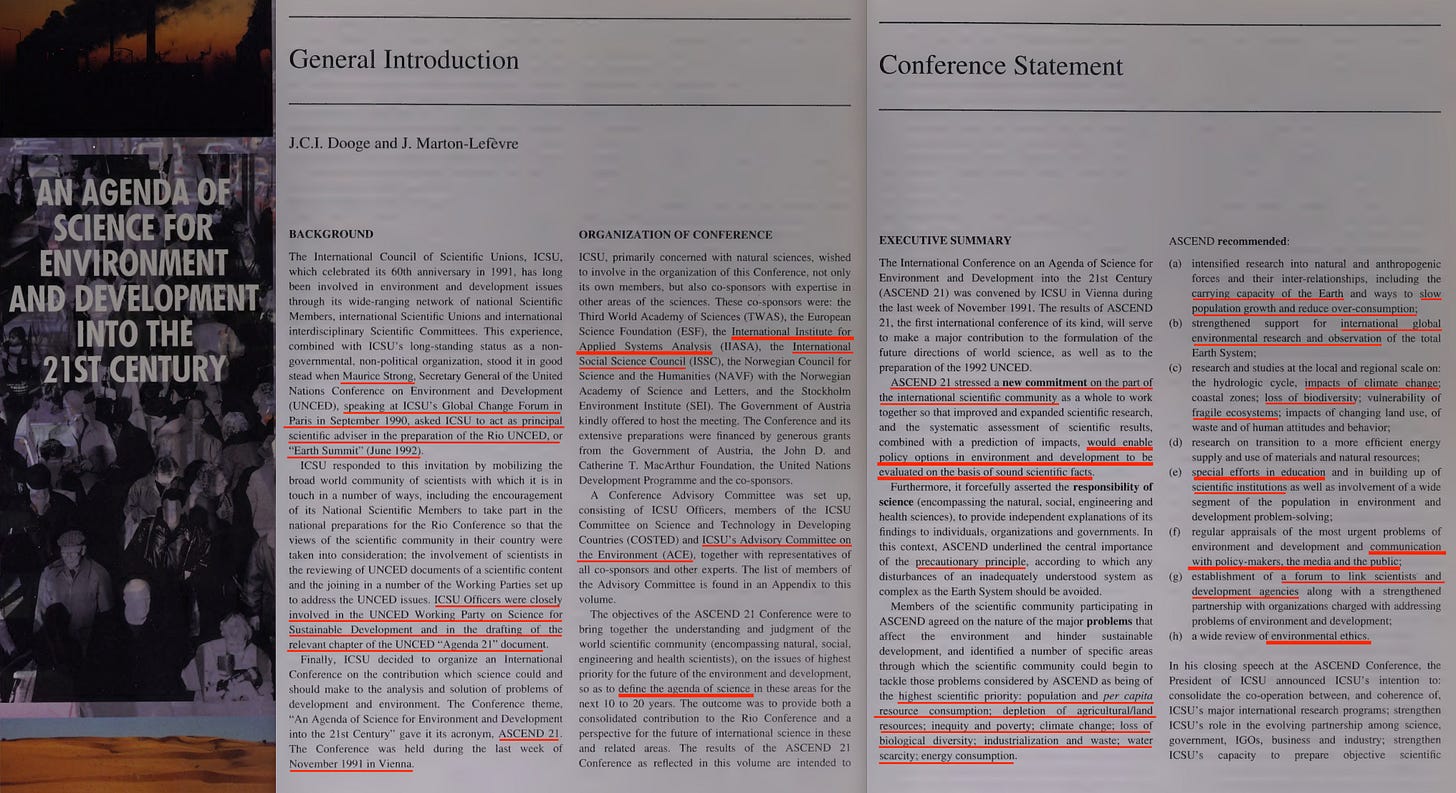








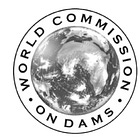




Escape, one does not comply.
Vigano will not recognise jesuit Bergoglio.
- Solidarity a vaccine for Europe -
" see Jacques Delores - former European Commission president.
May 8th 2020
" Europe will not be made all at once, nor according to a single plan. It will be built through concrete achievements which first create a de facto solidarity.” Ascribing to the same spirit as the founding fathers of Europe, today philosophers, religious and politicians are showing that solidarity is the cure to the afflictions of our contemporary society. "
" In short, physical confinement should enable spiritual liberation.”
According to Pope Francis in his encyclical Laudato si, we are called to live out solidarity at a personal level as much as on a social and global level, as a key value of the “human family”. This links to the principle of subsidiarity established in the Social Teaching whereby social and political issues should be resolved at different levels, giving priority to the smallest level, to allow for its best possible management.
In this way, the spirit of solidarity which inspired the founding fathers of Europe (Alcide de Gasperi, Jean Monnet, Paul-Henri Spaak, Konrad Adenauer) 70 years ago can and should become the vaccine to heal the European Union of the virus of selfishness and division today. "
Substitute Communism for Solidarity.
Jesuit oathbreakers have ursurped St Peters throne and their cancer infects Europe.
Bergoglio without words.
https://youtu.be/YHyYRumTwT0?si=O1yXjTmJQMzIP-ax
Thanks for all you do Escapekey.
https://jesc.eu/solidarity-a-vaccine-for-europe/
Let us not forget that Nelson Mandela was a hero to many, but he was later knighted by the British Monarchy who themselves are covered in colours of revolutions and Partners of the Roman Catholic Vatican.